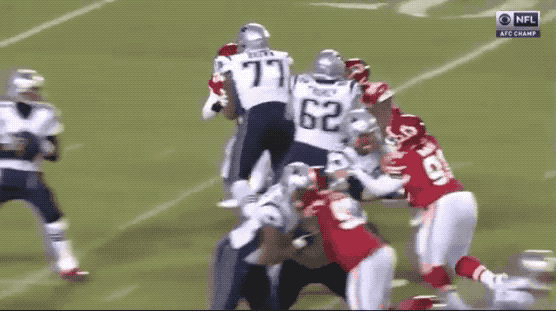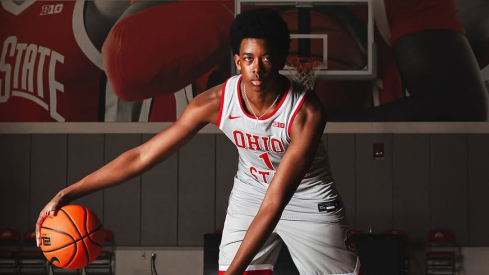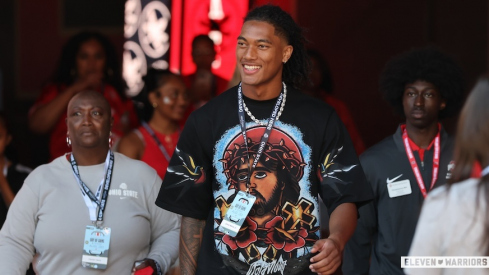Bad football officiating is kind of like autism.
Oh, hello there! Refereeing #takes only come in one temperature, and that temperature is piping-ass hot. You knew this long before you clicked. Stay with me here.
Forty years ago one in 2,000 kids was diagnosed with autism. Today it's one in 150 and it's no longer autism - it's the autism spectrum disorder. The conversation is a lot more complicated than it used to be because our knowledge and understanding of brain diseases have expanded.
Research has given the diagnosis a gradient, and while that well-documented expansion and the education that comes with it have driven both awareness and treatments, there's a fair bit of noise around unsubstantiated conspiracies contributing to those skyrocketing numbers. TL;DR we know more now. But there's still so much we know that we don't know about the autism spectrum yet, and it's more frustrating than ever - especially if you're affected by it.
Speaking of brains, football leagues at every level were glorifying concussion-producing missile hits during this current decade (RIP, ESPN's Jacked Up!) When Ohio State hired Urban Meyer, the idea that a player could be ejected from a game for even sort of looking like he might have possibly grazed an opponent's helmet with his own seemed impossible.
That's because in a very short period of time, unnecessary roughness became the unnecessary roughness spectrum. This conversation is a lot more complicated than it used to be because the litigation of our knowledge and understanding of brain diseases have expanded. The grim reality of today's game was impossible only yesterday.
Forty Rose Bowls ago Michigan and Southern Cal combined for five total flags. Earlier this month Ohio State and Washington drew 15 in Pasadena. THAT didn't seem weird. ONLY Five would have been weird.
Don't worry, eventually we will be talking about Denzel Ward, barbecue and hurt feelings. This is still an Ohio State web site.
The Halo Rule for fielding kicks arrived in college football in 1983. That glorious BCS title game in Tempe (GIF'd above) was the final one where players were forced to calculate and avoid an imaginary two-yard radius around a punt returner. It was a player safety rule that was eventually deemed useless, and by the time Ohio State began its title defense in 2003 the Halo Rule was history.
The unnecessary roughness spectrum isn't the only catalyst for rulebook tweaks and confusion. Replay arrived in 1999 to save us all from Sunday refs having bouts of being too human. Seven seasons later (too late for Chris Gamble winning the Fiesta Bowl in regulation in the GIF above) it came to help out the Saturday ones, but only partially. Replay is still heavily regulated and clunky. Plays that could benefit from it are often exempted.
Today's rulebook is a giant canon no one wants to memorize. It used to be a pamphlet. We have now reached the convergence of how the game is officiated and how leagues demonstrate good faith in using rules to protect players. That convergence is how we got here.
Forty years ago there were fewer bad calls because there were fewer calls, period. Forty Rose Bowls ago, Michigan and Southern Cal combined for five total flags (and a phantom touchdown that even the weakest replay booth would have overturned). Earlier this month Ohio State and Washington drew 15 penalties in Pasadena. It didn't even seem weird. Five would have been weird.
Speaking of Charles White fumbling before he crossed the goal line 40 Rose Bowls ago, I have no recollection from my formative football years of being wound up over officiating during every single game - and that was back when I cared more about those outcomes than my own health. Sure, I remember White's fumble, Colorado's 5th down; bad calls like those used to be accompanied by stone monuments because they were sentinel events.
Now you see them all the time. There's not enough granite on earth for today's officiating.
The well-documented expansion of rules has driven our officiating awareness, but there's a fair bit of noise around unsubstantiated conspiracies contributing to the calls, or lack of calls. Some calls, like holding, completed passes, fumbles, pass interference, spotting the ball - those are not new, and they get missed or botched in every game.
It's because refs have more calls to make now, which drives up the number of missed calls. It also drives up the number of bullshit calls. Their priorities aren't aligned with those of the fans. Be patient, Buckeye fan - we'll get to Ward soon enough.
Officiating at the highest levels of football has never been better than it is right now. Research and technology have expanded and given the rulebook a gradient, and while this has driven continuous improvement, there's a fair bit of noise around unsubstantiated conspiracies contributing to skyrocketing numbers of conspicuously bad calls.
Here's a relevant example of the spectrum. This is a roughing the passer penalty on a 3rd down incompletion that extended a drive in the AFC Championship Game. The Patriots ended up scoring a touchdown, without which the Chiefs would have won in regulation.

We are living in the same decade where the thought of this being a penalty did not exist. Today, we know this is an atrocious call, but we know why it happened. We know the intentions of an expanded rulebook are not always prosecuted correctly. We know Chiefs QB Patrick Mahomes had almost the exact same thing happen to him earlier in the game without a flag.
We know the Patriots had been stopped and were going to punt, but that call extended the drive - and gave them 15 yards in the process. New England would go on to score a touchdown instead of punting because Tom Brady's helmet was almost slapped by a defense end's pinky finger. Was it a mistake, or did the NFL quietly instruct the refs to elevate the 9th biggest TV market team over the 32nd? Makes you think.
The NFC Championship Game pitted the 2nd largest market against the 50th, and the home team was absolutely screwed on a missed pass interference penalty that would have effectively ended the game. It only took minutes before the names of the back and line judges were on Twitter, and one of them apparently had familial ties to Anaheim which was only the beginning of the doxxing machine that sprung into action while postgame interviews were still being conducted.
Saints fans are going to make sure that everyone remembers how their team was victimized for as long as they breathe. The rest of the game - the missed calls New Orleans benefited from, the other scoring opportunities that were squandered - those will fade into oblivion, since Rams fans (all, what, seven of them?) don't need to waste that energy. This creates the opportunity what scorned Miami Hurricanes fans effectively demonstrated following that night Tempe.
As an Ohio State fan who was in attendance that night - I cannot remember a more poorly officiated, one-sided game against my team. Miami was unprepared for Ohio State's defensive speed and got away with whatever it wanted to the entire evening. The Buckeyes should have won in regulation three different ways had the officials either thrown flags on obvious penalties or correctly ruled on the game-ending completion atop this article.
And had Ohio State lost, you would still be hearing about that officiating today.
Miami received a punt following those blown calls, which was then aided by illegal blocks and holds that allowed the Hurricanes to begin their final drive in field goal territory. They received every possible break and had defeat snatched from them in the 4th quarter.
However, we know how the game ended in two overtimes - and the pass interference penalty on Glenn Sharpe is the only play that remains in the general consciousness 16 years later. Ohio State only won because of a bad call. It's a mystifying interpretation of what that game objectively presents upon reviewing, which - understandably - only Ohio State fans do with regularity. One team got the brunt of bad officiating that night. It won in spite of it.
the NFL Did Not ASK officials to help the 9th & 2nd LARGEST TV markets beat the 32nd and 50th. IT HASN'T HELPED EITHER NEW YORK TEAM MAKE THE PLAYOFFS IN YEARS.
The only mistake Terry Porter made (we know the name of the back judge who threw the flag because of course we do) was signaling both defensive holding and pass interference. The correct call was holding. Officials in 2002 had no replay to help them with Gamble. Porter's crew finally found the appetite to make holding call on that play. Minutes earlier, Willis McGahee's knee exploded. They had the Halo Rule to police shortly before Ethnic Sands rode the illegal block train into field goal range.
And it was a title game. The zebras had a lot going on that night.
That crew did not have it out for Ohio State any more than it was biased against Miami. Officials at every level back in 2002 were superior to the ones from 1992, but they still weren't good enough for the rulebook or players of the era. That goes for the officials in Kansas City and New Orleans last Sunday. It's entirely reasonable to say officiating isn't meeting expectations and constantly evolving. It just isn't as fun playing the victim.
Of course they can improve easily improvable things, like for example - putting a face on a replay booth that consistently takes 2000% longer than it should to reach any conclusion. I'd be interested in seeing which grandpa they have fumbling around with the remote in that booth, because any other explanation for why it takes so damn long for them to see what broadcasters, everyone in the stadium and everyone watching on television has already seen doesn't make as much sense.
Refs could also do a better job of correcting their mistakes during the game. They should wave off a lot more flags than they currently do. They should throw a lot more late flags than they currently do. Nope, too late to do what's right needs to be removed from football. Pride should come from getting it right, not hiding what's wrong.
Perhaps that will be part of the continued evolution. Guys like Ward, penalized and ejected for absolutely no reason whatsoever, could be un-ejected after further review - two, three or ten plays later. Acknowledgement of mistakes that could be corrected in a manner and with a justification that makes sense would effectively eliminate the concept of the make-up call. This wouldn't sterilize football's appeal. It could enhance just how human of a game it really is, all the way down to how it is judged and regulated.
We'd get a game with more than just good calls. We'd get a good call spectrum.



